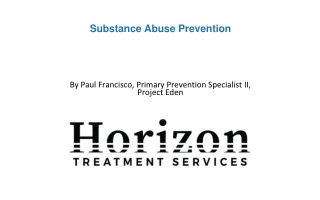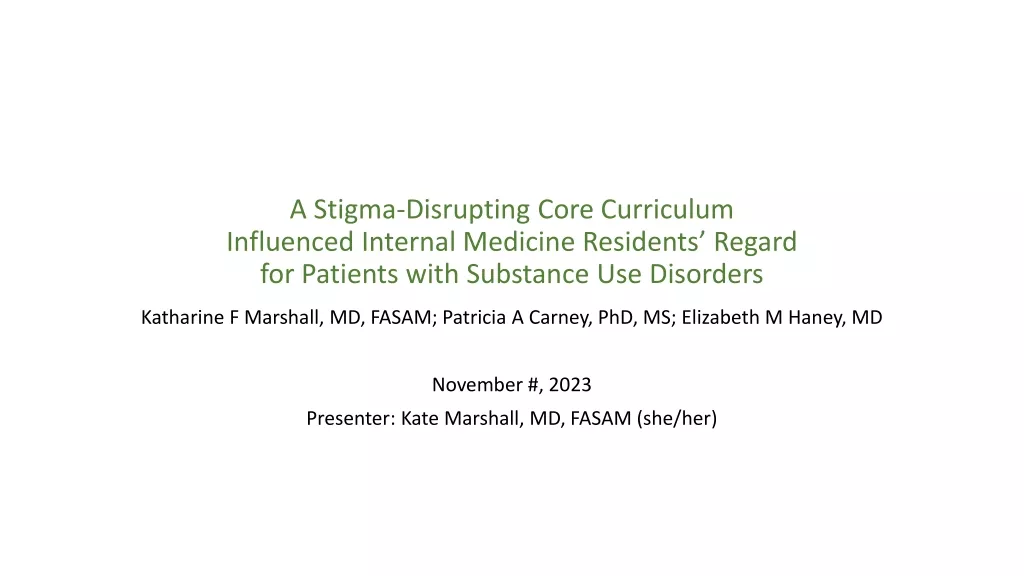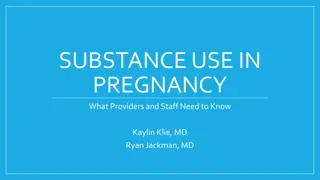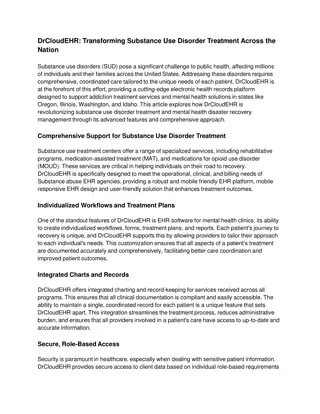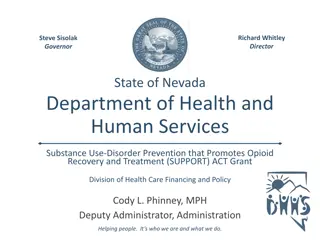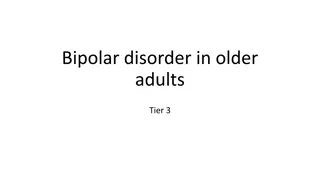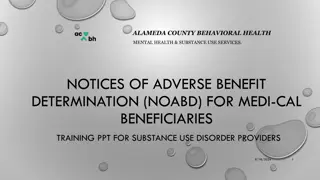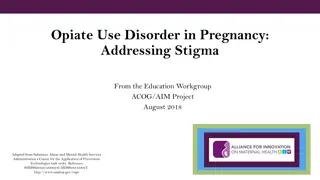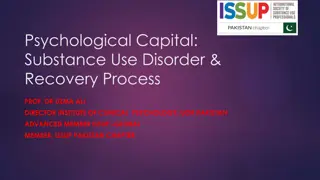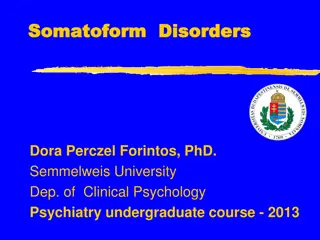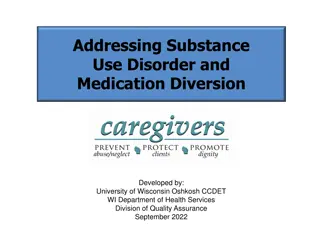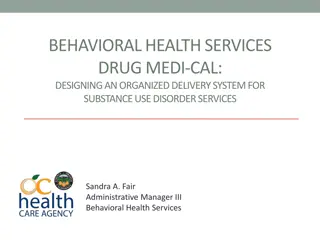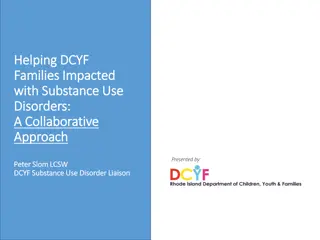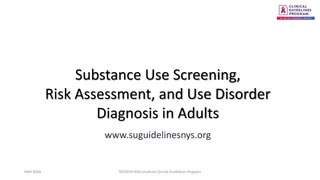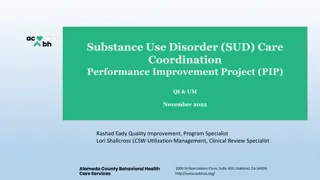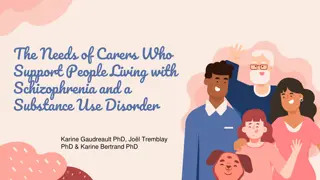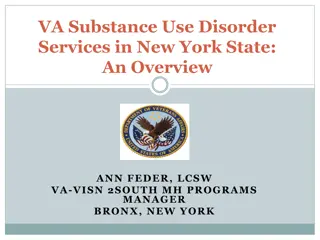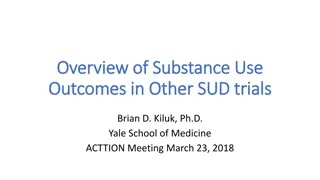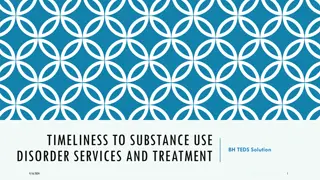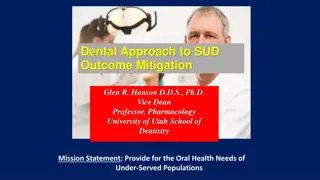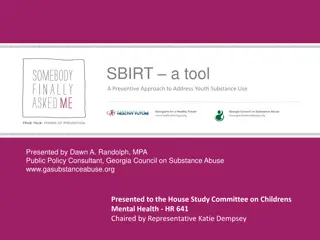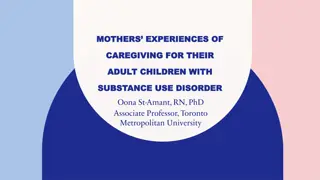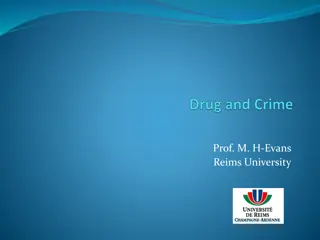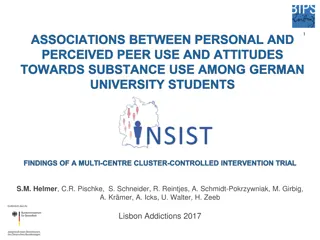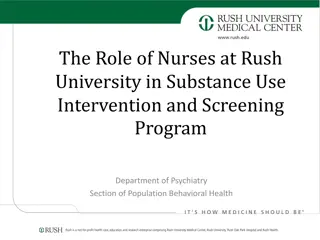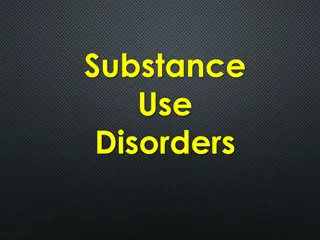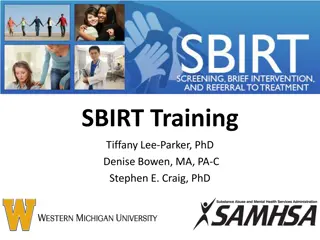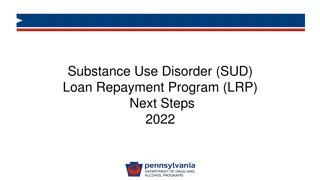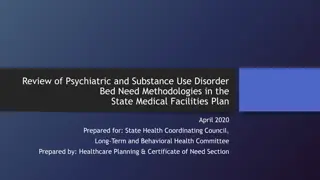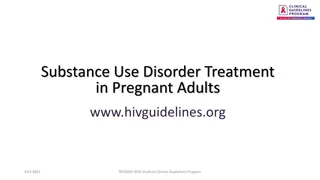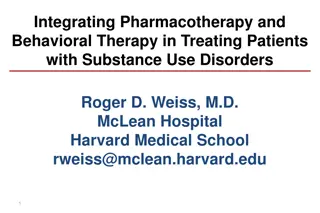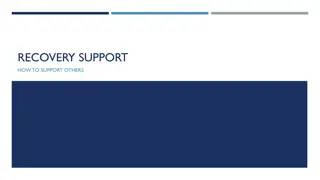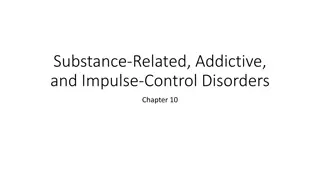Substance Abuse Prevention
Exploring substance abuse prevention strategies by Paul Francisco, a Primary Prevention Specialist. The session covers defining substance abuse, statistics of youth substance use, types of substances used, warning signs for parents, and preventative measures. Learn about the harmful effects of vapin
0 views • 42 slides
Substance Use Disorder Services at UVM Clinical Psychology PhD Program
Providing substance use disorder services, the UVM Clinical Psychology PhD program and Vermont Psychological Services at the University of Vermont offer comprehensive support for individuals struggling with addiction.
2 views • 17 slides
Drug-Free Workplace Training Overview
This drug-free workplace training provides essential knowledge for supervisors in identifying and responding to substance misuse among employees. It covers statistics on substance use disorders, the benefits of a drug-free workplace, relevant federal laws, warning signs of substance misuse, and the
2 views • 27 slides
Enhancing Internal Medicine Residents' Approach to Patients with Substance Use Disorders
This study focuses on developing and implementing a stigma-disrupting curriculum to improve internal medicine residents' attitudes and knowledge regarding patients with substance use disorders. By addressing provider stigma and enhancing preparedness, the aim is to promote positive regard and increa
1 views • 27 slides
Substance Use Screening Tools in Pregnancy: SURP-P
The Substance Use Risk Profile Pregnancy (SURP-P) is a screening tool to assess substance use during pregnancy. It involves questions about marijuana smoking, alcohol consumption, and perceived need to cut down on substance use. Scoring determines low, moderate, or high risk levels. A brief assessme
4 views • 6 slides
Substance Use in Pregnancy: Important Considerations for Healthcare Providers
This presentation discusses the impact of substance use during pregnancy, including identifying signs of substance use disorder, trends in national and Colorado statistics, effects on maternal health and fetal development, screening recommendations, minimizing stigma, and treatment options for pregn
0 views • 35 slides
Article 26_ DrCloudEHR_ Transforming Substance Use Disorder Treatment Across the Nation
Explore effective solutions for substance abuse EHR with DrCloudEHR in Louisiana, Maryland, Pennsylvania, Washington DC. Discover personalized programs for substance abuse and mental health services administration
0 views • 3 slides
Understanding Anxiety Disorders and Related Conditions
Explore the distinguishing features of anxiety disorders such as generalized anxiety disorder, panic disorder, and phobias, along with insights into obsessive-compulsive disorder (OCD) and posttraumatic stress disorder (PTSD). Delve into the impact of conditioning, cognition, and biology on these co
2 views • 46 slides
Substance Use Disorder Prevention & Opioid Recovery Initiatives in Nevada
Richard Whitley, Director of Nevada's Department of Health and Human Services, spearheads the Substance Use-Disorder Prevention that Promotes Opioid Recovery and Treatment (SUPPORT) ACT Grant program. The initiative focuses on areas like SBIRT, provider qualifications, Medicaid screening, MAT policy
0 views • 11 slides
Understanding Bipolar Disorder in Older Adults
Bipolar disorder in older adults can have a later onset, often after the age of 50, with episodes of mania and depression. Recognizing symptoms like excessive energy, inability to sleep, and cognitive impairment is crucial. Late-onset bipolar disorder differs from early-onset in familial illness rat
1 views • 12 slides
Understanding Co-occurring Mental and Physical Health Conditions
Co-occurring mental and physical health disorders are prevalent and require an integrative multidisciplinary approach for effective assessment and treatment. This holistic approach helps address the complexity of managing multiple disorders in an integrated healthcare setting. Through a multi-direct
1 views • 37 slides
Alameda County Behavioral Health Training for Substance Use Disorder Providers
This presentation provides training for substance use disorder providers in Alameda County Behavioral Health. It covers topics such as notices of adverse benefit determinations for Medi-Cal beneficiaries, learning objectives related to NOABDs, authority and references including CMS regulations, and
0 views • 17 slides
The Link Between Teen Bullying and Substance Use: Insights and Implications
The article discusses the link between teen bullying and substance use, emphasizing the various forms of bullying such as physical, verbal, and cyberbullying. It also explores the relationship between being bullied and engaging in alcohol and marijuana use, highlighting statistics on how bullying ca
0 views • 15 slides
Understanding Stigma in Opioid Use Disorder During Pregnancy
Stigma plays a detrimental role in Opioid Use Disorder (OUD) during pregnancy, leading to fear of judgment and hindering individuals from seeking help. This stigma can result in dropping out of treatment programs and societal exclusion. Substance use disorder, including OUD, is highly stigmatized, a
0 views • 24 slides
Understanding Psychological Capital in Substance Use Disorder Recovery
Explore the concept of Psychological Capital (PsyCap) and its role in the recovery process of Substance Use Disorder. Learn about the domains of PsyCap and how it enhances personal growth and performance, aiding individuals in achieving sobriety. Discover the different forms of Recovery Capital and
1 views • 19 slides
Understanding Somatoform Disorders: Symptoms, Diagnosis, and Treatment Options
Somatoform disorders are characterized by physical symptoms that mimic general medical conditions without an underlying medical or mental disorder. Patients often exhibit somatic symptoms without an organic basis, have poor insight, and do not find reassurance helpful. Common types include somatizat
0 views • 46 slides
Understanding Substance Use Disorder and Medication Diversion
Substance use disorder (SUD) can affect anyone regardless of age, occupation, or background. This training module covers the identification of SUD, best practices for prevention, and the impact of opioid use disorder. It emphasizes the importance of recognizing medication diversion and provides insi
0 views • 19 slides
Designing an Organized Substance Use Disorder Service Delivery System
This project aims to enhance Substance Use Disorder (SUD) services provided through Drug Medi-Cal (DMC) in California by offering an organized delivery system. The 5-year pilot project offers expanded services to individuals with SUD, promoting treatment access and sustained recovery. Factors such a
0 views • 13 slides
Collaborative Approach to Supporting Families Impacted by Substance Use Disorders
Peter Slom, DCYF Substance Use Disorder Liaison, presents a collaborative approach to helping families impacted by substance use disorders. Partnering with Parents Support Network, the program offers assistance, referrals, and support through Certified Peer Recovery Specialists. These specialists he
0 views • 13 slides
Substance Use Screening, Risk Assessment, and Disorder Diagnosis Guidelines for Adults
This clinical guideline program aims to increase identification of unhealthy substance use among New York State residents and improve access to evidence-based interventions. It provides guidance on substance use screening, risk assessment, and promoting a harm reduction approach for substance use di
0 views • 19 slides
Understanding CAST: A Tool for Assessing Community Susceptibility to Substance Use Disorders
CAST (Calculating for an Adequate System Tool) is a tool developed by researchers at SAMHSA to assess the protective capacity of a community and its susceptibility to Substance Use Disorders (SUD). It considers various community determinants such as demographics, social factors, and access to resour
0 views • 12 slides
Substance Use Disorder (SUD) Care Coordination and Treatment Outcomes Overview
This presentation covers the Substance Use Disorder Care Coordination Performance Improvement Project (PIP) with a focus on Program Improvement Projects (PIPs), SUD treatment outcomes, discharge status by modality, transitions in 30 days, and the impact of care coordination/case management on improv
0 views • 17 slides
Understanding the Needs of Carers Supporting Individuals with Schizophrenia and Substance Use Disorder
This study focuses on identifying and prioritizing the needs of carers who support individuals living with schizophrenia and a substance use disorder. The research highlights the challenges faced by carers, the positive effects of their support, and the lack of studies addressing their specific need
0 views • 39 slides
Veteran Care and Substance Use Disorder Services in New York State
This overview discusses the importance of recognizing veterans, asking pertinent questions, and providing patient-centered care in addressing substance use disorder services in New York State. The content emphasizes the need to identify veterans, inquire about their military experience, and collabor
0 views • 24 slides
Alcohol Use Outcomes in Substance Use Disorder Trials
This presentation provides an in-depth overview of assessing alcohol use outcomes in substance use disorder (SUD) trials. It covers various assessment methods, common outcomes like percent days abstinent and heavy drinking days, preferred outcomes such as percentage of heavy drinking days (PHDD), an
0 views • 19 slides
Enhancing Timeliness and Quality in Substance Use Disorder Services
Focus on improving performance and quality in substance use disorder services through timely admissions, reducing exceptions, and utilizing existing data collection mechanisms effectively. Emphasize reporting on performance indicators for better quality improvement and address challenges in wait tim
0 views • 37 slides
Dental Approach to Substance Use Disorder Outcome Mitigation Study Results
This study evaluated the impact of providing integrated oral health care to individuals in substance use disorder treatment programs. The program, known as FLOSS, showed positive outcomes such as longer treatment duration, higher treatment completion rates, reduced homelessness, increased employment
0 views • 16 slides
Preventive Approach to Addressing Youth Substance Use: SBIRT Tool Presentation
The presentation by Dawn A. Randolph highlights the importance of preventive approaches in addressing youth substance use. It emphasizes the need for early identification and intervention to ensure a better future for children and teenagers in Georgia. Substance abuse disorders affect millions of in
0 views • 21 slides
Mothers' Experiences of Caregiving for Adult Children with Substance Use Disorder
Examining the historical perspectives influencing family roles in addiction, this study delves into the challenges faced by mothers caring for adult children with substance use disorder (SUD). It highlights the impact on families, the prevalence of addiction in Canada, and the imperative role of fam
0 views • 22 slides
The Statistical Association Between Substance Misuse and Criminal Behavior
This brief synthesis discusses the statistical association between substance misuse (specifically drugs and alcohol) and criminal behavior. It draws upon meta-analyses investigating the links between drug use and crime, as well as alcohol consumption and violent behavior. Various theories are explor
0 views • 12 slides
Associations Between Substance Use and Peer Influence Among German University Students
This study explores the associations between personal substance use, perceived peer use, and attitudes towards substance use among German university students. It focuses on social norms interventions and the adaptation of personal behavior based on perceived peer behavior. The study aims to assess s
0 views • 26 slides
The Role of Nurses at Rush University in Substance Use Intervention and Screening Program
The nurses at Rush University play a crucial role in the Substance Use Intervention and Screening Program Department of Psychiatry, focusing on SBIRT (Screening, Brief Intervention, Referral to Treatment) to identify and intervene with those at risk for substance use issues. The program utilizes Mot
0 views • 13 slides
Understanding Substance Use Disorders and Associated Factors
Substance use disorders encompass conditions arising from the abuse of alcohol, psychoactive drugs, and other chemicals, leading to physical and psychological dependencies with withdrawal symptoms upon cessation. Psychological factors such as inferiority complex and poor impulse control, along with
0 views • 42 slides
SBIRT Training Overview: AUDIT, SBIRT Proficiency, Health Impacts, and Video Review
Explore the SBIRT training sessions covering topics such as AUDIT interpretation, SBIRT proficiency checklist, health impacts of substance use, and video reviews. Learn about interventions, screenings, brief interventions, and referrals to treatment for substance use disorders. Gain insights into th
0 views • 15 slides
Substance Use Disorder (SUD) Loan Repayment Program Next Steps
Detailed guide on the next steps for the Substance Use Disorder (SUD) Loan Repayment Program in 2022, including applying for an SAP vendor number, filling out necessary forms, receiving the vendor number, and important considerations for vendors.
0 views • 16 slides
Review of Psychiatric and Substance Use Disorder Bed Need Methodologies
The report discusses the methodologies for determining the need for psychiatric and substance use disorder beds in the State Medical Facilities Plan, addressing the disconnect between existing methodology and the perceived need for additional beds. It explores principles, assumptions, calculations,
0 views • 29 slides
Substance Use Disorder Treatment in Pregnant Adults: Guidelines and Recommendations
This guideline provides evidence-based recommendations for the management of substance use disorder (SUD) during pregnancy, aiming to expand access to treatment, promote harm reduction strategies, address stigma, and improve maternal and neonatal health outcomes. It highlights the prevalence of SUDs
0 views • 17 slides
Integrating Pharmacotherapy and Behavioral Therapy for Substance Use Disorders
This presentation by Dr. Roger D. Weiss discusses the integration of pharmacotherapy and behavioral therapy in treating patients with substance use disorders. It emphasizes the goals of behavioral therapy alongside medication treatment, focusing on medication adherence, defining and achieving substa
0 views • 73 slides
Supporting Recovery and Overcoming Barriers in Substance Use Disorder
Explore the challenges and barriers individuals face in seeking treatment and achieving recovery from substance use disorder. Discover the importance of integrating peer support into treatment services to address these obstacles and promote successful recovery across diverse populations.
0 views • 28 slides
Understanding Substance-Related and Addictive Disorders
This chapter delves into Substance Use, Intoxication, Substance Abuse, Addiction, Withdrawal, and Psychological Dependence. It explores the varying levels of severity in substance-related disorders and the distinction between physiological and psychological reactions to drugs.
0 views • 37 slides
